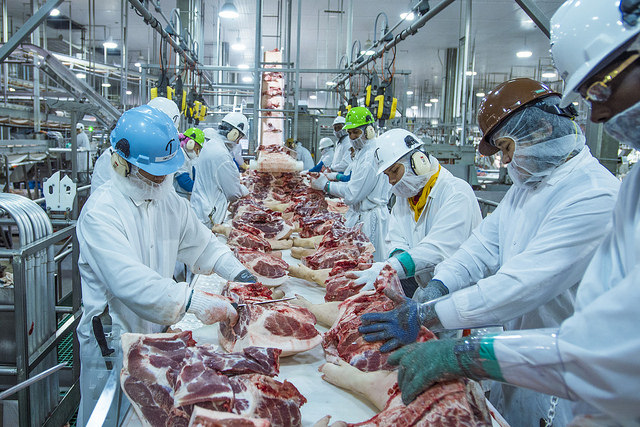



US pork producers prioritise COVID-19 safety and new economic opportunities
The latest Capitol Update from the NPPC explains the US pork industry's next moves for 2021.Osha releases guidance on COVID-19 mitigation and prevention in the workplace
Occupational Safety and Health Administration (OSHA) has announced guidance on mitigating and preventing the spread of COVID-19 in the workplace setting. Among specifics, it recommends employers implement COVID-19 prevention programs in the workplace, including wearing personal protective gear, maintaining at least six feet of distance where possible and installing barriers where physical distancing cannot be maintained.
NPPC and the US pork industry are committed to worker safety in plants and on farms. Thanks to numerous prevention efforts, pork packing plants are no longer experiencing widespread COVID outbreaks. Pork processing plants are an essential part of the US food supply chain, and will continue to work to ensure the most affordable, high-quality protein is delivered to consumers here at home and around the globe.

Last month, NPPC, the North American Meat Institute and the National Cattlemen’s Beef Association sent letters to all 50 state governors, urging them to prioritise COVID-19 vaccinations for meat and poultry industry workers, directly after healthcare workers and other high-risk individuals.
Philippines considers reducing pork import tariffs
The Philippines’ government plans to hold a hearing next week to discuss a proposal to reduce its pork tariffs for in-quota and out-quota imports. Specifically, the country’s Department of Agriculture (DA) is recommending pork imports under the minimum access volume (MAV) have a five percent tariff for the next six months and a 10 percent tariff for the succeeding six months, compared to the current 30 percent tariff. For pork imports outside the MAV, the DA proposes tariffs be reduced to 15 percent for the next six months and 20 percent in the succeeding six months, compared to the current 40 percent.
This proposal comes on the heels of NPPC’s previous meeting with US Ambassador to the Philippines Jose Manuel Romualdez. NPPC has been working with the Philippines’ government for more than a year to negotiate lower pork import tariffs. NPPC welcomes the DA’s proposal, as the Philippines holds tremendous market opportunities for US pork exports.
NPPC's Giordano highlights the need for China to remove retaliatory tariffs on US pork
Earlier this month, NPPC Vice President and Counsel, Global Government Affairs Nick Giordano moderated a Global Business Dialogue panel about China trade issues and the challenges and opportunities for the United States, other nations, and the World Trade Organisation.
In brief remarks, he highlighted the importance of China removing its retaliatory duties on US pork imports. “Pork is the most consumed meat protein in the world, and it is by far the most consumed meat in China, the world’s largest pork-consuming nation….China represents an enormous market opportunity for the farmers I represent,” he said. “While a significant part of our export growth can be attributed to the outbreak of African swine fever in the Chinese herd, we view China as an extremely important, long- term market for US pork.
It is in our obvious interest that the United States and China eliminate retaliatory import duties, and find a way to effectively address the many bilateral trade issues confronting the two countries, without resorting to continued trade confrontation,” he added. In addition to China removing its retaliatory import duties on US pork, a top NPPC priority is for the US to re-join the CPTPP.








